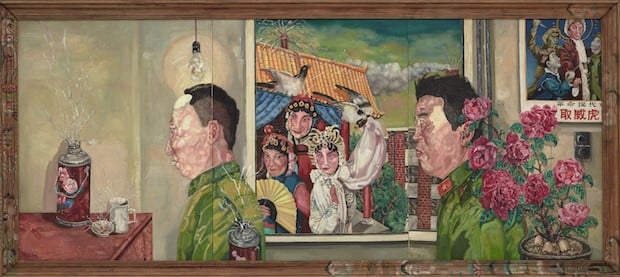
Photo: courtesy Sotheby’s.
Despite worries of China’s economic slowdown hitting Chinese demand for art and luxury goods, art is still serving as an alternative asset for China’s rich as they avoid the shaky domestic stock market.
Sotheby’s kicked off its Hong Kong spring auctions on April 3 with solid results at an evening sale that set major global artist price records and approached the pre-sale high estimate.
“Our modern and contemporary Asian Art evening sale provided a very strong start to our spring auction season,” says Sotheby’s Asia CEO Kevin Ching of the auction. “The result demonstrated the market’s continued enthusiasm for high-quality art, with a robust total of HK$605 million/$77.5 million—toward the high end of our pre-sale expectations.”
The auction saw “strength across all three categories,” says Ching, with nine global artist auction records and 87 percent of lots sold. A total of 55 percent of works were sold over their high estimate.
Chinese contemporary art saw especially significant demand. The top lot of the auction was Wang Huaiqing’s Feet 2 (diptych), which set an artist record with a price of $6.9 million (HK$54.5 million), well above the high pre-sale estimate of HK$40 million. Liu Wei’s painting The Revolutionary Family Series (triptych) also set an artist record when it sold for $5 million (HK$38.84 million), making it the number four lot of the sale.
Another major Chinese contemporary highlight of the auction was The Sleeping Venus by Xu Beihong, which topped its high estimate and was the second most expensive lot at $5 million (HK$39.4 million).
With all top lots sold to Asian collectors, including one sale to Shanghai’s Long Museum, the auction results showed buoyant Chinese demand that defied concerns about a slumping luxury and auction market. As mainland China’s ongoing anti-corruption campaign continued and its stock market plunged in 2015, luxury sales declined by 2 percent throughout the year, according to Bain & Company. China’s art market was hit even harder, as the European Fine Art Foundation reported that total sales declined by 23 percent to $11.8 billion last year.
But at the same time, China’s stock market turbulence has spurred the country’s wealthy to seek out alternative investments such as international real estate and fine art. The recently concluded Art Basel in Hong Kong, which concluded March 26, also showed signs of a turnaround in Chinese demand.
Prominent Hong Kong gallerist Pearl Lam told Nikkei, “In my personal experience, China seems to be purchasing more art, not less,” while Tina Keng Gallery sold two works by Wang Huaiqing for $3.3 million in total. Tina Keng Gallery, David Kordansky Gallery, and Pace Gallery all told the that they had sold almost all the works they exhibited at the event, with Pace’s regional partner noting that sales were “spectacular” this year.
This story was submitted by artnet News content partner Jing Daily.